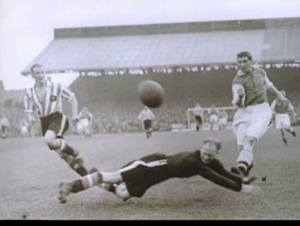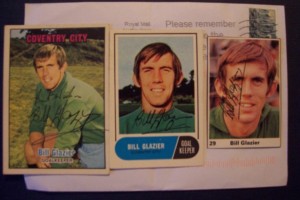 I was reading through some old Brentford programmes from the 60s the other day and saw a note congratulating Gordon Phillips on making his debut for the club in an FA Cup match against Margate.
I was reading through some old Brentford programmes from the 60s the other day and saw a note congratulating Gordon Phillips on making his debut for the club in an FA Cup match against Margate.
Nothing really out of the ordinary, apart from the fact that the article revealed that after the arrival of Joe Crozier in 1937 Brentford only played nine different goalkeepers between then and the mid 60s.
A quite remarkable record when you consider how regularly teams change players, as well as how often goalkeepers get hurt.
For the record, throughout that thirty year period the Bees fielded Joe Crozier, Ted Gaskell, Reg Newton, Sonny Feehan, Alf Jefferies, Gerry Cakebread, Fred Ryecraft, Chic Brodie and Gordon Phillips.
What is even stranger is that the last four named played in successive games in 1963.
How often can a club have had different goalkeepers in four consecutive matches?
I certainly cannot think of any other examples and wonder if anybody else can?
Joe Crozier was unobtrusive and a model of consistency and was a key part of the Brentford team that took the First Division by storm in the late thirties.
What a bargain he was as he was signed for only one thousand pounds.
He played three wartime International matches for Scotland, conceding eight goals against England on his debut, and yet he kept his place for the next game.
 Shades of Frank Haffey at Wembley in 1961 perhaps?
Shades of Frank Haffey at Wembley in 1961 perhaps?
After his retirement from football Crozier became managing director of Cory Lighterage and a Freeman of the City of London.
I have previously written about Gerry Cakebread and how he combined a career with the Admiralty with his football commitments.
He was the undisputed first choice for nearly a decade, and played one hundred and eighty-seven games in a row between 1958 and 1963.
In 1955 Gerry was named as reserve goalkeeper in the England Under 23 squad to Coventry City’s Reg Matthews.
Two players from the Third Division were recognised as the most promising young goalkeepers in the country.
It could never happen today.
Reg went on to win full International caps, but hindered perhaps by his part time status, Gerry didn’t, but many supporters think that he was the finest goalkeeper they have seen play for the club.
Remarkably, in his last season at Griffin Park, with his career winding down, Gerry was allowed to take a leave of absence of nearly a month to visit Russia for an extended business trip.
Can you see any manager granting a player similar permission today?
 He also had a long and successful career after football and was awarded an OBE in 1995 for his work on Hydrographics at the Ministry of Defence.
He also had a long and successful career after football and was awarded an OBE in 1995 for his work on Hydrographics at the Ministry of Defence.
Fred Ryecraft was his patient understudy from 1959-1964 and from the look of him he would appear to have spent much of his spare time eating and training in the local Wimpy Bar rather than in the gym, as he was a portly figure to say the very least, and was known to eagerly accept, if not solicit, sweets proffered by young supporters standing behind his goal.
He is the nearest that Brentford have ever come to Fatty Foulke, and quite how he ever managed to get his massive frame off the ground hardly bears thinking about.
He certainly filled the goal but, in truth, loyal deputy that he was, he wasn’t really up to the standard required and drifted off to Gravesend where he was also known to play at centre forward.
He wasn’t alone in that feat as Luton goalkeeper Tony Read was converted into a striker during the 1965/66 season and scored an impressive twelve goals in only twenty games, including a match-winning hat-trick against Notts County, before he ran out of goals and was moved back to his original position.
Chic Brodie was a wonderful servant to the club and was calm and composed in everything he did on the pitch.
He was an old style goalkeeper, nothing ruffled him, and he was consistent and totally lacking in flamboyance.
He was also one of the last goalkeepers I can remember who rarely, if ever, seemed to wear gloves.
Those were the days when keepers simply spat on the palm of their hands and hoped that the ball would stick.
Misfortune seemed to follow Chic around throughout his career.
He is best remembered for conceding nine goals to a rampant Ted MacDougall when playing for Margate, and, of course, for the notorious incident when a stray dog ran full tilt into his knee at Colchester practically ending his professional career.
Ted MacDougall has a clear recollection of poor Chic Brodie:
 The keeper always said he thought he was the unluckiest goalkeeper in football.
The keeper always said he thought he was the unluckiest goalkeeper in football.
He said one day he went to put his flat cap on for a game because it was sunny and he found a hand grenade in it.
Then when he was playing for Brentford a Jack Russell ran on the pitch and smacked him on the leg and nearly broke it.
Then, during another game, the crossbar broke and fell on his head.
And then to top it off, I scored nine goals against him.
Chic suffered his final tragedy when he died far too young, but he was a skilled craftsman and, ever vigilant, he will always live long in my memory.
 Gordon Phillips was a local prospect who was initially behind Brodie in the pecking order given his age and lack of experience, but he made the goalkeeping position his own in 1966 for a couple of years, and he and Chic vied for the first team spot in the late 60s with first one coming out on top, and then, the other, and it was not until Chic’s retirement that Gordon became the undisputed first choice.
Gordon Phillips was a local prospect who was initially behind Brodie in the pecking order given his age and lack of experience, but he made the goalkeeping position his own in 1966 for a couple of years, and he and Chic vied for the first team spot in the late 60s with first one coming out on top, and then, the other, and it was not until Chic’s retirement that Gordon became the undisputed first choice.
Given our customary lack of resources, Gordon was also named as an outfield substitute at Crewe in September 1970, but his services were not called upon on the night.
Gordon was an ever present in the 1971/72 promotion team and enjoyed a wonderful season, but things soon turned sour with Brentford suffering the ignominy of relegation at the end of the following season and Gordon’s time at the club was over.
Where Chic was solid and consistent, Gordon was smaller, slighter and more dynamic in his approach.
 Given his lack of height, he struggled with crosses, but he compensated with his speed of thought and reaction, acrobatic shot stopping and his ability to snuff out danger by diving fearlessly at opponents’ feet.
Given his lack of height, he struggled with crosses, but he compensated with his speed of thought and reaction, acrobatic shot stopping and his ability to snuff out danger by diving fearlessly at opponents’ feet.
Another local boy, Paul Priddy, still an amateur, succeeded Gordon, but after an up and down couple of years he was replaced by Steve Sherwood who achieved the rare feat for a loanee of being ever present in the 1974/75 season and also being voted Player of the Year.
We apparently made a pretty feeble effort to sign him on a permanent basis, but Watford outbid us by shelling out a mere five thousand pounds.
Instead of buying a promising young keeper who would end up playing in the Football League until he was forty, we ended up taking a four thousand pound gamble that unfortunately did not pay off and totally backfired.
That was Brentford to a T!
Bill Glazier had a long and distinguished career at the top level, playing over four hundred and fifty games for Crystal Palace and Coventry City and three times for the England Under 23 team.
 He was only thirty-two when he was persuaded to put off his retirement and sign for Brentford, but he seemed to be far more interested in running his hotel in Brighton than in keeping the ball out of the Brentford net.
He was only thirty-two when he was persuaded to put off his retirement and sign for Brentford, but he seemed to be far more interested in running his hotel in Brighton than in keeping the ball out of the Brentford net.
He was distracted, commuted from the South Coast, and seemed to lack commitment.
His performances were poor, culminating in an appalling and costly fumble that led to Brentford conceding a soft equaliser at Old Trafford just when it appeared that the Bees might be on the verge of pulling off a massive League Cup giant killing.
He soon shuffled off into retirement and Paul Priddy seized his opportunity and played for a couple of seasons without ever totally convincing either his manager or the supporters that he was the long term answer to our goalkeeping problem.
He had one unforgettable afternoon at Vicarage Road when he was unbeatable and touched by genius, saving two penalties and single-handedly earning Brentford a rare victory at Watford.
 On other days he was less authoritative and consistent and Bill Dodgin, perhaps harshly, released him in 1977.
On other days he was less authoritative and consistent and Bill Dodgin, perhaps harshly, released him in 1977.
Another local boy who so nearly made it, but not quite.
Paul wouldn’t take “no” for an answer and even managed to sneak back for a third spell at the club as reserve goalkeeper in 1981, playing one farewell match against Chester, when he signed off with a clean sheet, before having a long and successful career as a well-respected goalkeeping coach.
The cheque book then came out and Dodgin paid Bristol City eight thousand pounds for Len Bond, and he repaid us with three good years of consistent and brave goalkeeping, before falling out with Fred Callaghan and leaving the club.
 We made a profit on him, but his leaving was a real shame as he was still in his prime, and he subsequently had a long spell at Exeter, but he was stretchered off on a return visit to Griffin Park before being the largely blameless recipient of Brentford’s seven goal salvo at Exeter in 1983.
We made a profit on him, but his leaving was a real shame as he was still in his prime, and he subsequently had a long spell at Exeter, but he was stretchered off on a return visit to Griffin Park before being the largely blameless recipient of Brentford’s seven goal salvo at Exeter in 1983.
Brentford’s last goalkeeper of the 70s was Trevor Porter, a last minute emergency replacement when Bond was injured in a car crash, just before the start of the 1978/79 season.
Porter was an old friend of Paul Shrubb, and had also played under Bill Dodgin at Fulham, and we rescued him from oblivion at Slough Town for a fee of seven hundred and fifty pounds.
He lasted for a couple of seasons and did a steady, unobtrusive job when called upon, and, when he wasn’t, he kept up his previous career as a window cleaner.
So, Brentford fielded a variety of goalkeepers in the 60s and 70s, some good, some indifferent, but the only real shocker I can remember was Garry Towse, a talented all-round sportsman in his own right, but an average goalkeeper at best, who signed for the club from Crystal Palace and was in goal on that sad October afternoon in 1973 when Brentford conceded four goals in the opening seventeen minutes at Scunthorpe, and sank to the bottom of the Football League for the first time in their history.
The only way from there was up and I will reminisce about Brentford’s goalkeepers from the 80s and 90s in the near future.

